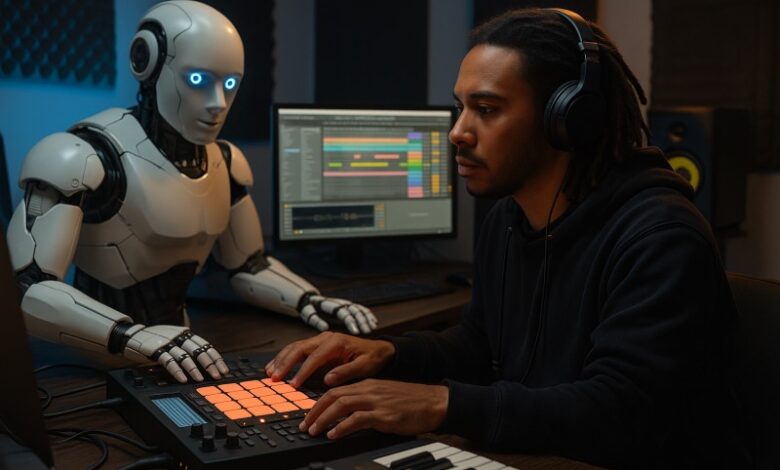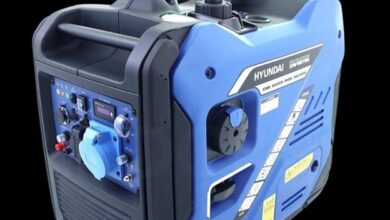AI in the Studio: Can Artificial Intelligence Really Help Beatmakers Craft Fire Tracks?

Alright, let’s talk beats. That head-nodding, soul-shaking foundation of so much of the music we love, from hip-hop to electronic, pop, and beyond. For decades, beatmaking has been a craft honed through countless hours of digging for samples, mastering drum machines, and intuitively feeling out grooves. It’s an art form that blends technical skill with raw creative instinct. So, the big question buzzing in the tech and music worlds right now is: can Artificial Intelligence, a realm often associated with logic and algorithms, genuinely help beatmakers in their creative quest?
Spoiler alert: the answer is a resounding yes. But perhaps not in the “robot overlord takes over the MPC” way some might imagine. Instead, AI is emerging as a powerful collaborator, a tireless assistant, and an inspiring new instrument in the beatmaker’s toolkit. Let’s break down how AI is changing the game for producers and beat architects.
Deconstructing the Beat: Where AI Steps In
To understand AI’s impact, let’s look at the typical beatmaking workflow and see where these intelligent tools can lend a hand (or a circuit?).
-
The Spark: Overcoming Beat Block & Finding Inspiration
Every creative hits a wall sometimes. That dreaded “beat block” where the ideas just aren’t flowing. This is where AI can be a fantastic muse.
- Melody & Chord Progression Generation: AI tools can suggest starting points for melodies or chord progressions based on a chosen key, mood, or genre. You don’t have to use them as-is, but they can be brilliant for kickstarting an idea or taking you in an unexpected direction.
- Rhythmic Starters: Similarly, AI can generate basic rhythmic patterns or drum loops that can serve as a foundation to build upon or chop up.
-
Sound Design & Sample Alchemy: Crafting Unique Textures
A beatmaker’s signature often lies in their unique sound palette. AI is opening up new frontiers here.
- AI Synthesizers: Some AI tools can generate entirely new synth sounds based on descriptive prompts or by analyzing and morphing existing sounds.
- Intelligent Sample Transformation: Imagine feeding a sample into an AI that can then reinterpret it in different styles, isolate specific elements (like separating vocals from instrumentals – a process called stem separation), or even generate variations.
- Quick Custom Loops & Elements: This is where tools that help you generate specific audio snippets on the fly become incredibly useful. For instance, maybe you need a unique atmospheric pad, a short, catchy melodic phrase to build around, or a specific rhythmic texture that you can’t quite find in your sample packs. Instead of spending hours searching or trying to craft it from scratch, you could explore how to make AI music for these specific elements using a platform like Adobe Express. You can simply describe the vibe you’re after – “eerie synth arpeggio for a trap beat,” “warm, lo-fi Rhodes chord progression,” or “a glitchy, percussive texture” – and the AI can generate royalty-free options in seconds. This isn’t about the AI writing your whole beat; it’s about quickly getting those foundational ingredients or unique sonic spices that can elevate your track and save you valuable creative time.
-
Drum Programming & Groove Enhancement: Finding the Pocket
Drums are the heartbeat of most beats. AI can assist in:
- Pattern Generation: AI can generate drum patterns in countless genres, from boom-bap to drill to house. These can be used as starting points or for inspiration.
- Humanization & Swing: One of the biggest challenges in programming drums is making them feel natural. AI tools can analyze human drumming patterns and apply subtle variations in timing and velocity (the “humanize” function on steroids) to make programmed drums groove and swing more authentically.
-
Arrangement & Structure: Building the Journey
Turning a loop into a full song requires thoughtful arrangement.
- Structural Suggestions: Some AI tools can analyze existing tracks or your current loop and suggest potential song structures (verse, chorus, bridge, etc.) or ways to build energy and create variation.
- Automated Fills & Transitions: AI might suggest or even generate small fills or transitional elements to help connect different sections of your beat smoothly.
-
The Polish: Assistive Mixing & Mastering
While a skilled human ear is irreplaceable for the final mix and master, AI can offer a helping hand.
- AI-Powered Mixing Plugins: These tools can analyze your tracks and suggest starting points for EQ, compression, and levels, helping you achieve a cleaner, more balanced initial mix.
- Automated Mastering Services: Several online services use AI to provide a quick master for demos or for producers who are still learning the intricacies of mastering. Again, it’s a great starting point or a way to get tracks sounding decent quickly, but for commercial releases, professional mastering engineers are still key.
Why Beatmakers are Embracing AI (Hint: It’s Not About Laziness)
So, what are the tangible benefits driving this adoption?
- Breaking Creative Bottlenecks: AI provides fresh perspectives and starting points when inspiration runs dry.
- Accelerating Workflow: Repetitive tasks can be offloaded, freeing up more time for the core creative work.
- Expanding Sonic Possibilities: Access to new sounds and transformative tools that were previously unimaginable.
- A Powerful Learning Tool: Analyzing AI-generated patterns or suggestions can actually teach beatmakers more about music theory, arrangement, and sound design.
- Democratizing Beatmaking: AI tools can lower the barrier to entry, making it easier for aspiring producers to start creating without needing years of traditional training or expensive gear.
The Human in the Machine: AI as a Collaborator
It’s crucial to emphasize that AI is not here to replace the beatmaker. The soul, the feeling, the story, the unique taste – these are all human elements that AI, in its current form, cannot replicate. A great beat has a personality, an intention. AI doesn’t have life experiences, emotions, or cultural context to draw from in the same way a human does.
Think of AI as the ultimate intern or a super-powered assistant. It can handle tasks, offer suggestions, and bring new ideas to the table, but the beatmaker is still the director, the producer, the artist making the final creative decisions. It’s about augmentation, not replacement.
Practical Steps to Integrate AI into Your Beatmaking Flow
If you’re a beatmaker curious about dipping your toes into the AI waters, here’s how you can start:
- Identify Your Pain Points: Where do you spend the most time or feel the most creatively stuck? Is it finding melodies? Crafting unique drum grooves? Sound design?
- Start with Specific Tools: Don’t try to overhaul your entire workflow at once. Experiment with one AI tool that addresses a specific need. Maybe it’s an AI drum pattern generator or a tool for creating quick melodic loops like the one mentioned earlier.
- Use AI as a Springboard: Take what the AI gives you and make it your own. Chop it, flip it, layer it, process it. Let it be the seed, not the entire plant.
- Maintain Your Critical Ear: Always trust your own taste and judgment. If an AI suggestion doesn’t feel right, discard it. You are the artist.
- Stay Curious and Keep Learning: The field of AI in music is evolving rapidly. Keep an eye on new tools and techniques, but always focus on how they can serve your unique creative vision.
The Future of Beats is Hybrid
The synergy between human creativity and artificial intelligence is paving the way for a new era in music production. For beatmakers, AI offers a chance to break new ground, streamline their process, and unlock sounds they might never have discovered otherwise. It’s not about human versus machine; it’s about human with machine, pushing the boundaries of what’s possible in the art of beatmaking.
So, if you’re a beatmaker, don’t shy away from AI. Explore it, play with it, and see how it can become a valuable partner in your creative journey. The next fire beat might just be a collaboration away.
What are your thoughts on AI in beatmaking? Have you experimented with any AI tools in your productions? Drop your experiences and favorite tools in the comments below!



